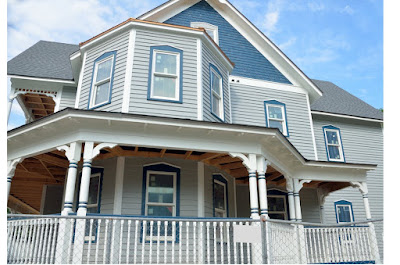What Home Improvements Are Tax-Deductible
Are home improvements exempt from tax? Which home improvements are eligible for tax deduction? These are crucial questions to ask yourself, whether you have renovated your home in recent years or if there is a plan to do so. Let's dig in a little more.
Is your Home Improvement Project Tax-Deductible
You can write off tax for many home improvement projects. However, it all depends on the type of remodel you are doing and whether it's a repair project or an improvement.
Repairs vs. Home Improvements
According to the IRS, a repair is any modification that brings a home back to its original value and/or state. Home repairs are not deductible, except for rental properties and home offices. We'll get to that later. TaxSlayer's team shares that home repairs include fixing broken windows, replacing broken hardware, and replacing broken roof shingles.
A home improvement is any change that improves the property's value. TaxSlayer identifies improvements as adding a driveway, a roof, siding, insulation, or a septic system to your home. While improvements are generally tax-deductible, others are only deductible if the home is sold within the given year.
You could, for example, deduct any home improvements you made in 2013 and then sell your house in 2020. Even if you don't plan to sell your home within the next year's time, it is vital to record any tax-deductible improvements made to your home throughout the process so you can make the most out of your upgrades. You can ask your local tax accountant for clarification if you are unsure if a repair is or an improvement is tax-deductible.
Daily Business Study Daily Business Study Daily Business Study Daily Business Study Daily Business Study Daily Business Study Daily Business Study Daily Business Study Daily Business Study Daily Business Study Daily Business Study Daily Business Study Daily Business Study Daily Business Study Daily Business Study Daily Business Study Daily Business Study Daily Business Study Eat Now Drink Later Eat Now Drink Later Eat Now Drink Later Eat Now Drink Later Eat Now Drink Later Eat Now Drink Later Eat Now Drink Later Eat Now Drink Later Eat Now Drink Later Eat Now Drink Later Eat Now Drink Later Eat Now Drink Later Eat Now Drink Later Eat Now Drink Later Eat Now Drink Later Eat Now Drink Later Eat Now Drink Later Eat Now Drink Later Eat Now Drink Later Eat Now Drink Later Eat Now Drink Later Eat Now Drink Later Eat Now Drink Later Eat Now Drink Later Eat Now Drink Later Eat Now Drink Later Eat Now Drink Later Eat Now Drink Later Eat Now Drink Later Eat Now Drink Later Eat Now Drink Later Eat Now Drink Later
3 Tax-Deductible Home Improvements
1. Renovating Energy-Efficiently
Types of Savings : Credit
Claim it in the same year
Homeowners can claim a credit up to 10% on their 2020 tax returns, along with the amount of energy-related property expenditures they have made or paid during the taxable calendar year (subject only to the maximum credit limit of $500).
TaxSlayer: "Tax law modifications reduced what qualifies to the Residential Renewable Energy Tax Credit. Only improvements for solar power remain intact." "The new tax law stipulates that credits for wind, fuel cell and geothermal improvements are only available through tax year 2017. The solar credit will not be removed until 2019, then it will be reduced by one percent each year through 2021."
2. For medical care, home improvements
Type of Savings
When You Can Claim it: Same Year
It is not easy to obtain tax deductions for home renovations related to medical treatment. If you intend to age in place, you may be eligible for full tax deductions. Medical equipment that is installed in your home for the sole purpose of providing care for you or your spouse can be deducted.
The following improvements can be considered fully-deductible, since they do not add value to your home.
The Tax Deduction Allows for Home Improvements in Medical Care
Construction of exit and entrance ramps
Extend hallways and doors
Modifying or lowering kitchen cabinets
You can add lifts to any floor.
Installing support bars in the bathrooms
Modifying smoke detectors or fire alarms
3. Home Office Renovations
Types of Savings
Claim it in the same year
Home office improvements are eligible for a tax deduction if they are used regularly and exclusively.
Home office renovations have witnessed some of the most important tax law changes in recent years. Employees who work in a space other than their employer's office are no longer eligible for tax deductions. However, self-employed individuals or those who own their own businesses can still deduct home office remodels.
There are two options for you if your home is eligible for the tax break. You can make repairs or improvements to any part of your home that is not used for business. You can deduct home office improvements over time, along with depreciation. Additionally, repairs are deductible during the tax year that they are completed. This is because they are necessary to maintain your business.
Home Improvements in the Office with a Tax Credit
Repairs done directly to your office
Improvements directly to your office spaces
Repairs to other parts or the home are partially deductible
Partially deductable: Some home improvements

Comments
Post a Comment